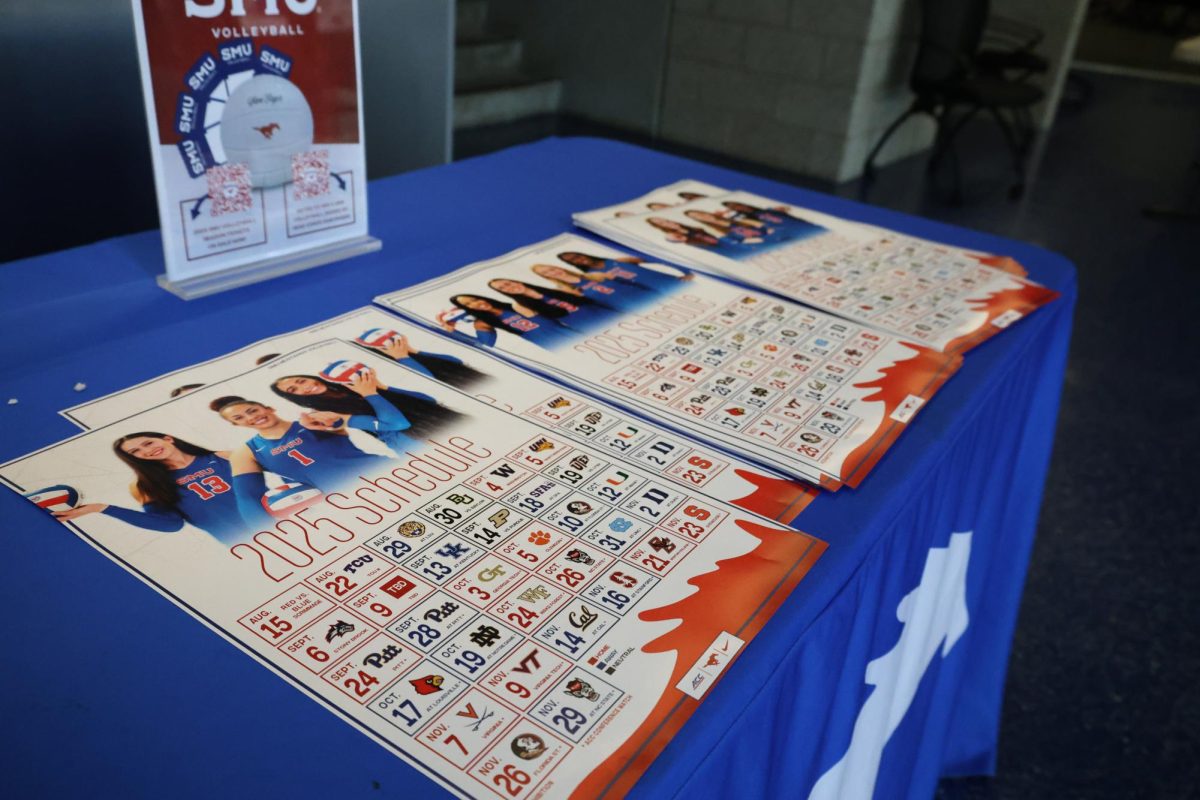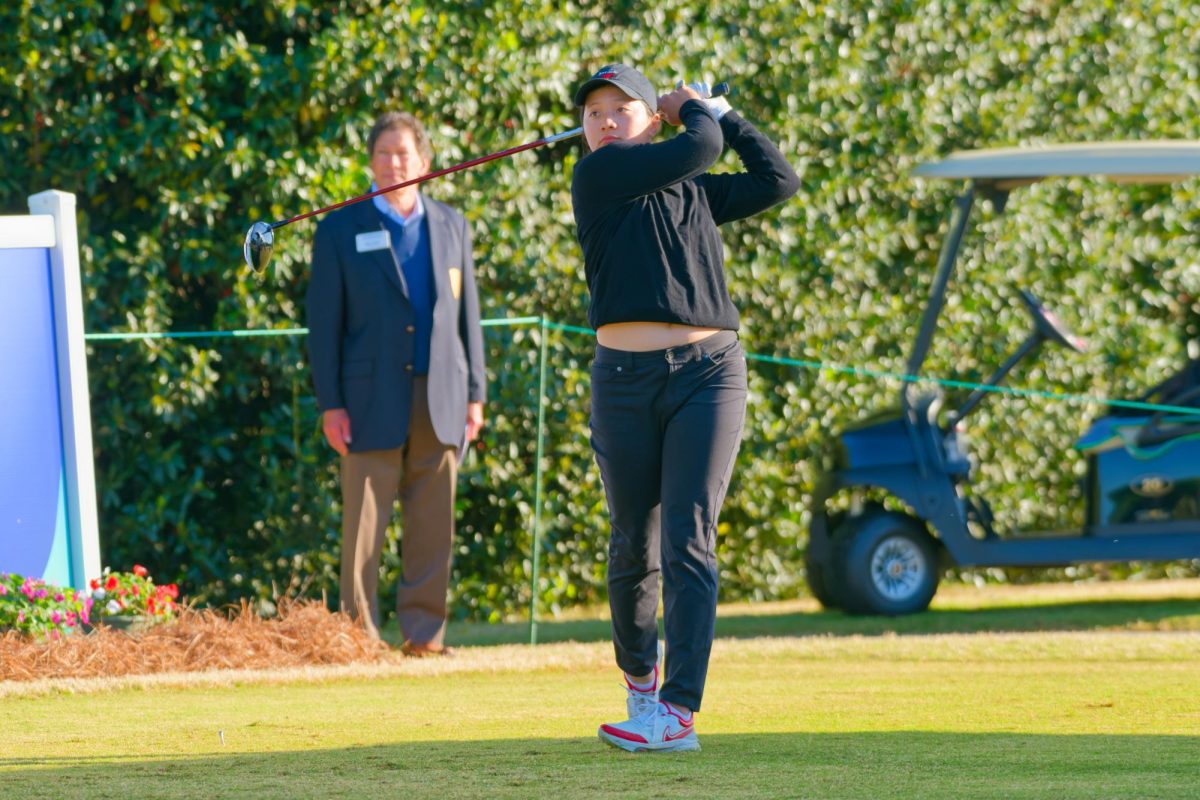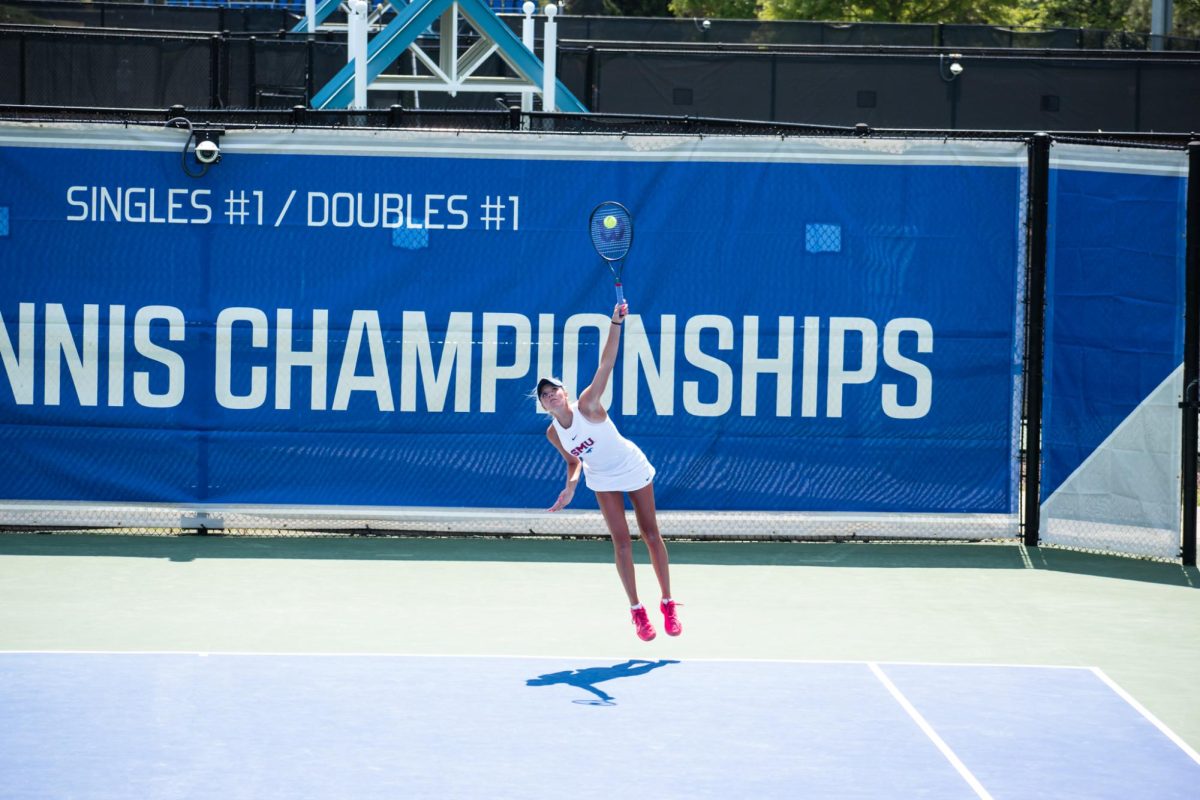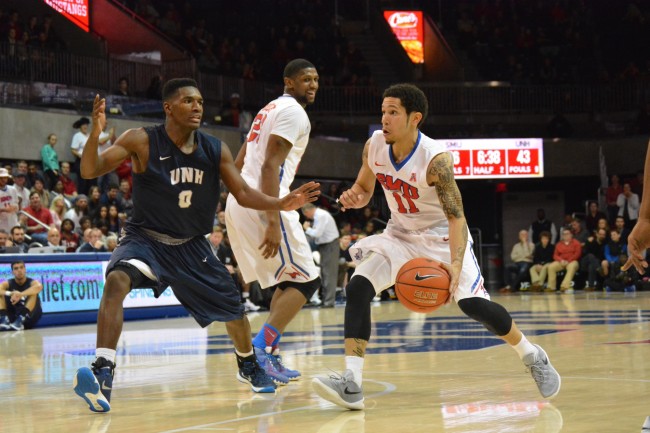
It’s a Friday afternoon in January at Moody Coliseum and SMU is preparing to play Memphis. SMU head coach Larry Brown is running his team through plays. He has the team run a particular play that is designed to get a layup by finding a player cutting to the basket.
The team runs it the first time, not to Brown’s standards. He gathers the team around the free throw line, telling the players how to run it properly. The huddle breaks with Brown’s instruction to run it again. As it’s breaking, Nic Moore chimes in.
“Little things, little things,” he says, urging his teammates.
SMU runs the play again. This time, it earns a “good job” from Brown.
Later in practice, Brown is deciding how he wants to defend one of Memphis’ frequently used plays. He is debating having two defenders switch once Memphis sets a screen as part of this play. He consults his point guard.
“That’s too long a run. Think he can do that?” the Hall of Fame coach asks Moore of one of the defenders.
Moore responds with a yes. Brown tells the defenders to switch.
The next day, SMU beat Memphis, 80-68. The Tigers shot just 32.8 percent and made five of their 20 3-point attempts. Moore scored a game-high 22 points. He played with an injured shoulder that kept him out of practice earlier in the week.
“He’s become everything you’d hope a senior would be,” Brown said after the game. “He hasn’t surprised me at all. Nic is what you want your seniors to be.”
The next week, senior forward and Moore’s close friend, Markus Kennedy, offered similar praise.
“He’s turning into Coach Brown a little bit,” Kennedy said. “Coach Brown barely calls plays anymore.”
Under Brown’s tutelage, Moore has grown into one of the nation’s premier point guards. He is finalist for the Bob Cousy Award, which is given to the best point guard in college basketball. He is a two-time first-team all-conference selection, the reigning American Conference Player of the Year and the leading scorer on the last college basketball team to lose a game this season. He has led SMU in scoring in each of his three seasons.
But while Moore continues to rack up individual honors, spark SMU’s offense and relish his role as a leader, he doesn’t want the attention on him. He isn’t one for instigating trash talk on the court or for fiery pre-game speeches. That hardly means he doesn’t care.
“Those accomplishments, that’s just part of the game to him,” Moore’s father, Michael, said. “He doesn’t brag about it. He just loves to play the game.”
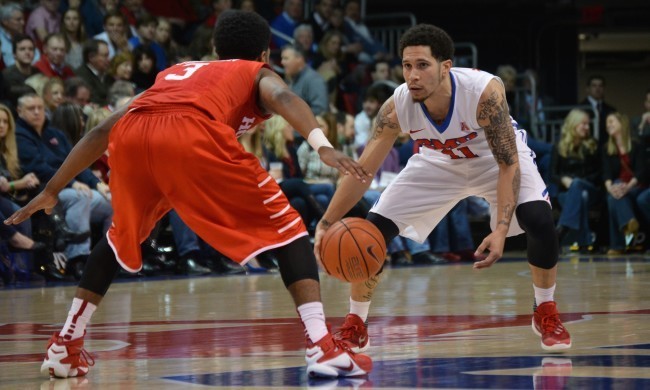
Moore, the youngest of three brothers, has played sports since he could walk. Michael likes to say his youngest son was raised in the gym, but Nic played baseball, football and soccer as a youth as well while growing up in Winona Lake, Ind., a town of about 5,000 residents located 120 miles north of Indianapolis. Michael saw a leader and competitor in him long before anyone else did. He said the traits are natural, but also inspired by being an athlete and by an off-court passion. Inspired by his grandmother, a teacher, Moore spent a lot of time working with special needs children in high school.
“Kids seem to get his heart,” Michael said. “The kids cling to him.”
It’s part of Moore’s natural ability to relate to people, which, naturally, helps on the basketball court. Just as children are attracted to him as a leader, players are too.
“He wants to perform for them,” Michael said.
By the time Moore was in high school at Warsaw (Ind.) High and had started the recruiting process, his leadership and competitiveness became clearer to many around him. It’s one reason why then-Illinois State head coach Tim Jankovich knew he wanted to sign Moore. He saw a player who could make an impact as a freshman, but was also an advanced competitor and leader.
“From the day I first really saw him and really started to coach him, I’ve never been around a better competitor or a guy who wanted to win as badly,” Jankovich, now SMU’s associate head coach, said.
Moore signed with Illinois State in the fall of 2010. As a freshman in 2011-12, his 10.0 points per game ranked third on a team that reached the Missouri Valley Conference title game and went two rounds in the NIT. He made 39 percent of his 3-point attempts to go with a team-best 3.9 assists per game. In his first college game, he led the Redbirds with 13 points in a 55-47 loss to Fresno State.
“He surprised his freshman year, in his first game,” Jankovich said. “I started to see the things like his will to win, his fight, how badly he wanted the ball when it was late. All those things that are really unusual from a freshman. He exceeded what I thought from day one.”
Five weeks after Illinois State’s loss to Stanford in the 2012 NIT, Jankovich accepted the head-coach-in-waiting job at SMU on April 26. Moore immediately decided to transfer. Indiana, Purdue, Illinois and Notre Dame were interested in him, but Jankovich’s presence and the opportunity to learn from Brown were too much too pass up. Jankovich had earned Michael’s approval long ago.
“When he came to see Nic and talked to me, he didn’t seem like he was reading off a script, so I knew he was genuine,” Michael said. “And the rest is history.”
For Jankovich, who made the rare move down from head coach to assistant coach, Moore’s move was special. Leaving Illinois State was difficult for Jankovich, but the equally rare move of a player following an assistant touched him.
“For him to reach out and say, ‘I want to come where you go,’ that meant the world to me,” Jankovich said.
The transition wasn’t easy. Coach Brown demands a lot. Moore had to sit out the 2012-13 season, per NCAA transfer rules, which Michael said “killed him.” He led SMU in scoring in 2013-14, but seniors Nick Russell and Shawn Williams were the team’s locker room leaders, a role Moore wasn’t quite ready to step into.
“He (Coach Brown) was tough on me at first, because he wanted me to be able to run a team, to see if I had that in me, to be the best point guard I can be,” Moore said.
After Williams and Russell left, Moore grasped the role. His leadership shined again. He kept producing big game after big game, carrying the team when it needed a spark. His big plays in important moments became routine, not surprising.
“[I sometimes think], there is going to be one of these nights, surely he’s not going to have it,” Jankovich said. “I’ve yet to see that one. He’s gone past what I can imagine. He’s the greatest competitor I’ve ever coached.”
Moore and Kennedy have won 78 games in their three seasons at SMU. SMU had never won 20 games in three straight seasons before those two arrived. This year’s 24 wins are tied for the most in a regular season in school history. This year, SMU earned an AP top-10 ranking for the first time in 31 years. Simply put, success has become normal at SMU. When SMU went 15-17 in Brown’s first year, in front of sparse crowds at old Moody Coliseum, few were thinking of success. Moore and Kennedy were.
“We just knew what type of players we are, how much love we have for this game, our compassion, to be able to change this,” Moore said. “We kind of knew we’d have this turn out.”
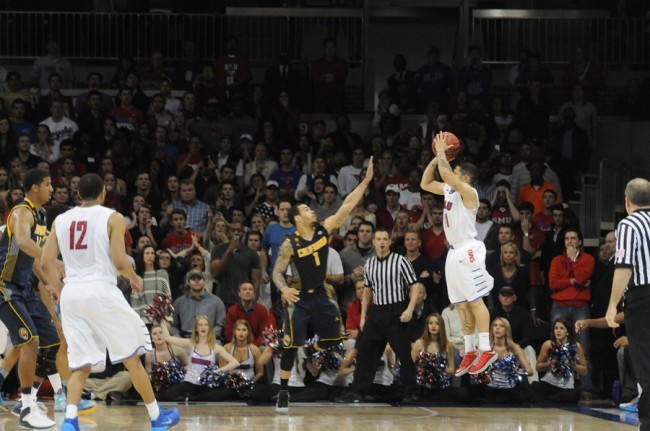
Moore, Kennedy, and forward Jordan Tolbert will play their final home game Thursday night vs. Connecticut. Their illustrious college careers will end when the buzzer sounds on March 6 at Cincinnati. For Moore, it’s a career that not only includes awards, but overflowing praise from those who watch him. Opposing coaches praise his basketball IQ. Brown praises his development.
“My admiration has grown every day,” Brown said. “Every time I see him play, I gain more and more respect for him.”
Michael Moore says his son will value being the coach on the floor, being the leader and being the unselfish teammate more than anything else. He will cherish the unique family bond the team has built. When asked about his most memorable moment, the younger Moore mentioned his game-winning 3-pointer vs. California that sent SMU to the 2014 NIT Final Four. But he couldn’t truly narrow it to one shot, one game or one award.
“Just to be able to change the culture, the community status of SMU basketball and just being able to be a part of that, it’s just great for every game,” Moore said.
Life without Moore, Kennedy and Tolbert will be hard for SMU, even with the culture of winning they created. That’s especially the case for Jankovich, who has known Moore for so long that he admitted Moore almost feels like a member of his family.
Yet Jankovich admitted one solution to ease the feeling of loss.
“Hopefully,” he said, “We’ll be watching him on TV.”



